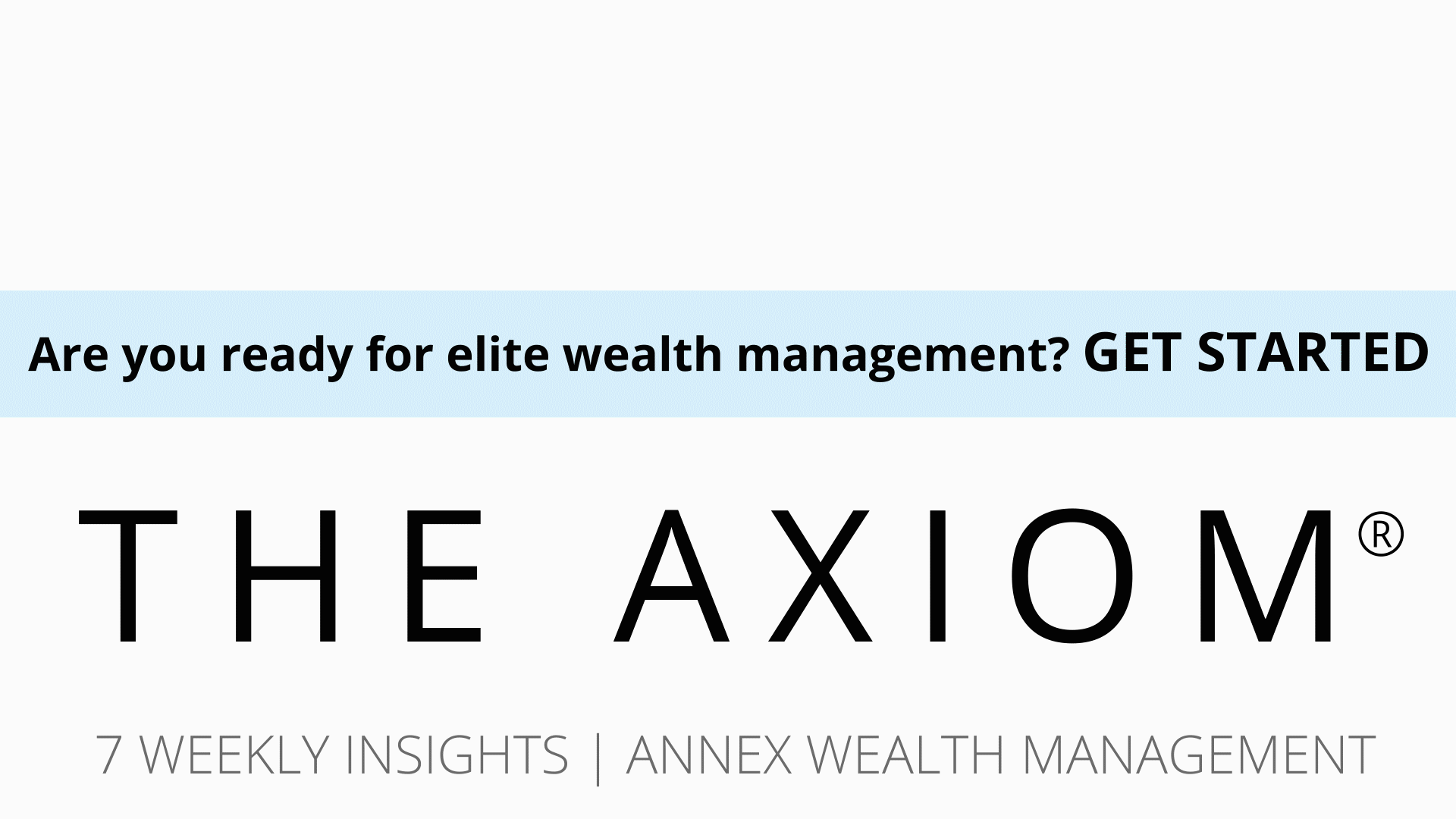
Axiom | Vol 257
Markets Up Going Into June – An Historically Weak Month | Elon Musk’s Diamond Hands Emoji Tweet Impacts Markets

Meet The Axiom®’s Guest Editor: Todd Voit, PhD
I’m Todd Voit, Annex Wealth Management’s Chief Investment Strategist.
I came to Annex by way of a merger. I owned and managed an investment firm that was rather boutique in that we managed portfolios for institutions and individuals composed of individual stocks and bonds as well as the use of options over the past 30 years. After casually being introduced to investment firms over the years who wanted to merge, I passed on all of them and found that Annex and Dave Spano, who I’ve known and worked with for quite a few years, were the perfect match.
As it turned out, a client said it best, that it’s a win-win-win for all parties involved. The opportunity to work with not only an investment team but other teams within the organization has personally helped me as well as the client tremendously.
BACK TO TOP ↑

Markets Up Going Into June – An Historically Weak Month
The markets were up again this week, riding mostly good news and a positive jobs report. As we enter what is historically the second weakest month of the year, Annex Wealth Management’s Derek Felske and Danny Clayton discuss what may be causing headwinds for the economy in the future.
BACK TO TOP ↑

Technological advancements have made life easier. Smart technology allows you to lock your doors, turn off lights, and play your favorite song through voice commands. Have you joined in on the current technology trends?
BACK TO TOP ↑

Estate Planning For Your High School Graduate
Turning 18 is often seen as a monumental age for independence. At 18, people are legally an adult that can vote, own financial accounts and assets, open a credit card, and make decisions without a parent or legal guardian.
However, it also signifies an age when parents no longer have legal access to financial or health care information. As a result, this week’s MoneyDo is work with your child to establish a basic estate plan.
Remember, estate planning isn’t just about asset transfers when we die. We also need to plan and name people to make decisions on our behalf if we can’t.
While your child may still be on your health insurance plan, you’re not automatically entitled to have access to medical records or to make medical decisions for them should the need arise. As an adult, your child can now legally decide who has access to that information and who can make a medical decision if they’re unable to do so. An updated HIPAA Release or Authorization will be needed now that he or she is legally and adult.
Named for the Health Insurance Portability and Accountability Act (HIPAA), this form authorizes medical care providers to release and share the student’s general medical information (such as diagnoses, medications, and test results) to the parents (or other designated individuals). Without it, health providers are legally prohibited from sharing such critical information.
There are defaults under law about who can make medical decisions. The situation can get complicated quickly if parents are divorced or disagree on a decision. The best course of action is to have a Health Care Power of Attorney executed that specifies who the decision-maker is and who can access medical records.
It’s also important to think about how your child’s financial situation changes when they turn 18. You may no longer have access to their bank accounts. If you’ve helped them budget and balance in the past, or occasionally deposit money into their account online, they may have to legally grant you access to do so.
You may be able to get account access with various bank specific forms, but your child may also have a simple brokerage account, own a car, or have any number of unique accounts or ownerships. A better option is to have them execute a Financial or Durable Power of Attorney in which they authorize someone to be able to access and manage their accounts and assets.
A simple Last Will & Testament is also part of a basic estate plan, as they can then decide who receives their assets, should the unthinkable happen. While they may not have much today, hard work may result in a nice internship, or summer job that pays them enough to start saving, so there could be an ‘estate’ to distribute.
Or, they also might be a beneficiary of a trust established by someone else (like a grandparent or aunt), in which they have a power of appointment to decide who receives their share if they die. Again, there are default rules established under state law, but the defaults aren’t always ideal or the best option.
You’ve spent years ensuring your child has the best options available. Don’t stop when they turn 18. Make sure they’ve taken simple estate planning steps. A few minutes of time could solve some monumental issues if they ever arise.
BACK TO TOP ↑

“One of the things I find valuable about Annex is the communication tools such as the Axiom. It is important from an investment perspective to communicate in good times and bad, particularly when markets are rough, and clients need perspective. There is also something for everybody, every week.”
– Guest Editor: Todd Voit, PhD | Chief Investment Strategist
________________________________________
This week’s Ask Annex comes from Kim, who asks:
“What is the procedure and cost of moving to a lower risk portfolio? Conversely, what is the procedure and cost to move to a higher risk portfolio?”
___________________________
We asked Annex Wealth Management’s Denis Johnson:
First, I’d love to have a conversation with you to identify the “why” behind a desired risk change. As a fiduciary, it is our core commitment and philosophy to place your best interest first. Your risk level is based on your tolerance for fluctuation. Typically, someone’s risk is a constant, regardless of market conditions.
Analogy: If you’re driving on a highway with a speed limit of 70 mph and come up to an RV traveling along at 60 mph in the right lane, you would have three choices:
- Stay behind the RV, following it all the way to your exit at 60 mph (considered Low Risk)
- Look over your left shoulder to make sure the coast was clear, and, when the left lane is free of cars, safely pass (considered Medium Risk)
- Look over your left shoulder, but only to avoid an accident, then squeeze into the left lane, traffic or no, and whip past the RV (considered Aggressive Risk)
Of course, we have better techniques for guiding our clients through the risk discussion. But, for me, I would make sure the coast was clear and safely pass. I was this way 10 years ago and I suspect I would do the same thing 10 years from n ow.
Our risk levels rarely, if ever, change; we are who we are. Therefore, it would be significant to have the “why” discussion first. There are certainly reasons for changing one’s risk level; a life altering change, a loss of a spouse or job, nearing retirement, or retirement.
Should you still feel the need to make a risk change(s), whether higher or lower, there would be a corresponding cost with that level of change. If it is a minor risk adjustment, the cost is likely lower. If the risk level change is a larger change, then the cost could be higher.
When moving from one risk level to a slightly higher or lower risk level, some of the same positions remain in place, where just a few of the positions would need to be sold and purchased. When moving from one risk level to a significantly higher or lower change, more position movement would be needed, therefore more costs may be incurred.
Each situation is unique and the cost for changing risk levels are well discussed before any changes occur. One specific factor to point out, these costs are not charged or collected by Annex Wealth Management, but by the respective custodian, whether its TD Ameritrade, Fidelity, or Schwab. Annex Wealth Management doesn’t collect anything beyond the agreed-upon fee for our services.
–Denis Johnson
BACK TO TOP ↑

Estate Planning Attorney Jill Martin, JD discusses building a plan for your vacation property – and how planning now prevents problems later.
Does Your Advisor Help You Plan For More Than Just Investments?
BACK TO TOP ↑


KNOW THE DIFFERENCE MINUTE:
Elon Musk’s Diamond Hands Emoji Tweet Impacts Markets
KNOW THE DIFFERENCE MINUTE:
Amazon Purchases MGM Studios
In Case You Missed It
Know The Difference: Dan’s Testimonial
BACK TO TOP ↑

Annex Wealth Management provides free workshops, open to the public, on key wealth management topics.
Each week, we provide links to register for upcoming events.
BACK TO TOP ↑